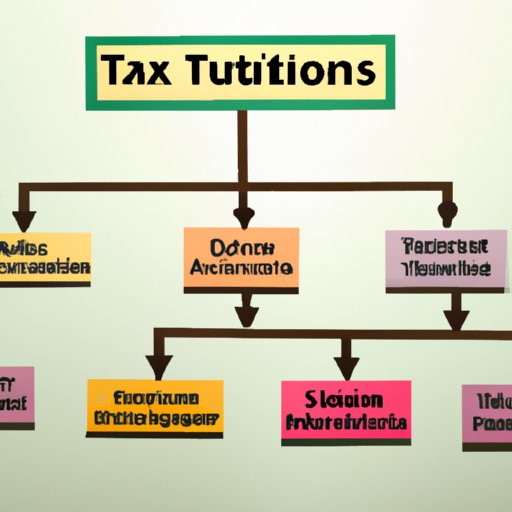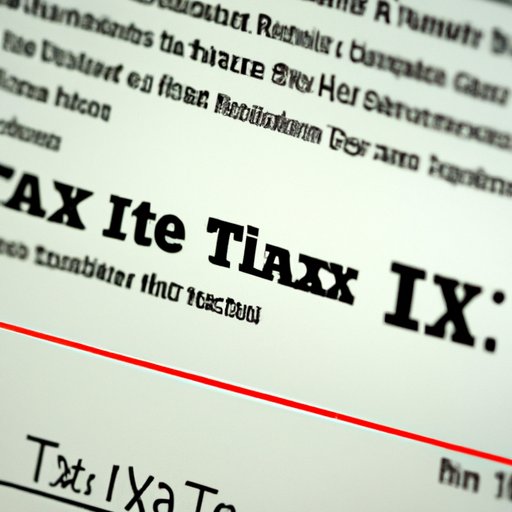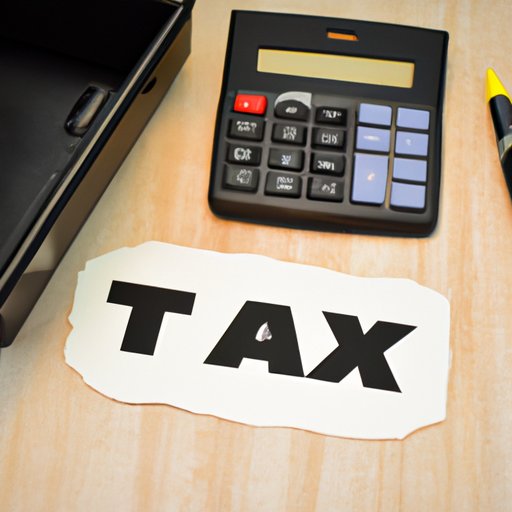Introduction
When starting a business, one of the most important things to consider is how to properly file taxes. Understanding the specific tax requirements of your business structure, how to calculate and pay estimated taxes, and what expenses can be deducted from taxes are all essential for ensuring compliance with the IRS. This article provides a comprehensive guide for filing taxes when starting a business.

Different Types of Business Structures and their Tax Implications
The type of business structure you choose will have significant implications for how you file taxes. The three most common types of business structures are sole proprietorships, partnerships, and corporations.
Sole Proprietorship
A sole proprietorship is the simplest type of business structure and does not require any formal registration with the IRS or state government. As the owner of a sole proprietorship, you are personally liable for any debts or liabilities incurred by the business. You will also report all business income and losses on your personal tax returns.
Partnership
A partnership is a business entity that is owned and operated by two or more individuals. Each partner is responsible for reporting and paying taxes on their share of the profits. The partnership itself is not subject to taxation, but it must file an informational tax return (Form 1065) with the IRS.
Corporation
A corporation is a business entity that is legally separate from its owners. Corporations are subject to double taxation, meaning they must pay taxes on their profits and shareholders must also pay taxes on any dividends they receive. Corporations must file an annual tax return (Form 1120) with the IRS.
Obtaining an Employer Identification Number (EIN)
An Employer Identification Number (EIN) is a unique nine-digit number assigned by the IRS to identify businesses for tax purposes. All businesses except sole proprietorships must obtain an EIN. An EIN is required for opening a business bank account, applying for business loans, and filing taxes.
What is an EIN?
An EIN is a nine-digit number issued by the IRS to identify businesses for tax purposes. It is similar to a Social Security number in that it is used to track financial information about the business. However, unlike a Social Security number, an EIN is not tied to an individual and can be used by multiple people.
How to Apply for an EIN
Applying for an EIN is easy and can be done online via the IRS website. You will need to provide basic information about your business such as the business name, address, and type of business structure. Once you have completed the application, the IRS will issue your business an EIN within minutes.

When to File Estimated Taxes
In addition to filing an annual tax return, businesses must also make estimated tax payments throughout the year. These payments are meant to cover the taxes owed by the business on its profits. Failure to make estimated tax payments can lead to penalties and interest charges.
What are Estimated Taxes?
Estimated taxes are payments made throughout the year to cover the taxes owed on the business’s profits. Depending on the type of business, estimated taxes may be due quarterly, semi-annually, or annually. The amount of estimated taxes owed can vary depending on the amount of income earned by the business.
How to Calculate Estimated Taxes
Estimated taxes can be calculated using the IRS’s Estimated Tax Worksheet. This worksheet takes into account factors such as business income, deductions, and credits to determine the amount of estimated taxes that should be paid. The worksheet can be found on the IRS website.
Expenses That Can be Deducted from Taxes
Certain expenses related to running a business can be deducted from taxes. These deductions can significantly reduce the amount of taxes owed by a business. It is important to keep accurate records of all expenses to ensure that all deductions are claimed correctly.
Commonly Deductible Expenses
Common deductible expenses include business travel, advertising and marketing costs, employee wages, and office supplies. Additionally, businesses may be able to deduct the cost of certain equipment, such as computers and machinery, from their taxes.
Additional Tax Deductions
In addition to the standard deductions, businesses may be eligible for certain tax credits and deductions. These include the small business health care tax credit, the research and development credit, and the home office deduction. To find out if you qualify for any of these tax credits or deductions, consult a qualified tax professional.
Keeping Accurate Records for Tax Purposes
Maintaining accurate records is essential for filing taxes correctly and avoiding costly penalties. The IRS requires businesses to keep records of all income, expenses, and other transactions for at least three years. Failing to keep accurate records can lead to problems when filing taxes.
What Records Should Be Kept
Businesses should keep records of all income, expenses, assets, liabilities, and other transactions. This includes invoices, receipts, bank statements, check registers, and other documents related to the business. It is important to keep these records organized and readily accessible.
Tips for Maintaining Accurate Records
There are several steps you can take to ensure that your records are accurate and up-to-date. First, set up a system for tracking all income and expenses. Next, use software to automate the tracking and recording of data. Finally, back up all data regularly to prevent loss or damage.

Benefits of Hiring a Professional Tax Preparer
Hiring a professional tax preparer can save time and money, and help ensure that taxes are filed accurately and in a timely manner. Professional tax preparers are knowledgeable about the latest tax laws and can help maximize deductions and credits for which your business may be eligible.
Advantages of Working with a Professional
Working with a professional tax preparer can provide numerous benefits. A professional can help make sure that all necessary forms are filled out correctly and all applicable deductions and credits are taken advantage of. They can also provide advice on how to minimize future tax liability and ensure compliance with the latest tax laws.
How to Find a Qualified Tax Preparer
When looking for a qualified tax preparer, make sure to do your research. Ask friends and family for recommendations and read online reviews. Make sure to verify the credentials of any potential tax preparer, and ask them questions to ensure they are experienced and knowledgeable.
Resources Available for Further Tax Guidance
The IRS provides a variety of resources to help businesses understand their tax obligations. Additionally, there are many other online resources available to help businesses stay informed about the latest tax laws and filing requirements.
IRS Resources
The IRS website offers a wealth of information and resources to help businesses understand their tax obligations. This includes information on filing requirements, deductions, credits, and more. Additionally, the site has helpful tools such as the Tax Calendar and the Small Business Tax Center.
Other Online Resources
In addition to the IRS website, there are many other online resources available to help businesses understand their tax obligations. Sites such as TurboTax and H&R Block offer helpful tools for calculating estimated taxes and finding deductions. There are also blogs and forums dedicated to helping businesses navigate the complex world of taxes.
Conclusion
Filing taxes when starting a business can be a daunting task, but it doesn’t have to be. By understanding the different types of business structures, obtaining an EIN, filing estimated taxes, taking advantage of deductions, and keeping accurate records, you can ensure that your business complies with the IRS and pays the least amount of taxes possible. Additionally, hiring a professional tax preparer can make the process even easier and ensure that all taxes are filed correctly and on time.
(Note: Is this article not meeting your expectations? Do you have knowledge or insights to share? Unlock new opportunities and expand your reach by joining our authors team. Click Registration to join us and share your expertise with our readers.)
